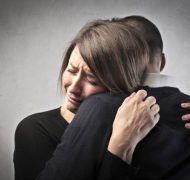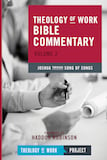Tragedy Strikes the Family of Ruth and Naomi (Ruth 1:1-22)
Bible Commentary / Produced by TOW Project
The story begins with a famine “in the days when the judges ruled” (Ruth 1:1). This was a time when the people of Israel had abandoned God’s ways and fallen into idolatry, horrific social conditions, and a disastrous civil war, as told in the chapters of Judges immediately preceding the Book of Ruth in Christian Bibles. (The books occur in different order in Hebrew Bibles.) As a whole the nation certainly had not been following the precepts of Torah with respect to work or anything else. The characters in the story—Naomi at least— recognized the loss of God’s blessing this brought (Ruth 1:13, 1:20-21). As a result, the socio-economic fabric of society was falling apart, and a famine gripped the land.
Responding to the famine, Elimelech, his wife Naomi and their two sons moved to Moab—a move of desperation given the long enmity between Israel and Moab—where they thought the prospects for productive work were greater. We do not know whether they were successful in finding work, but the sons both found wives in Moab. But within ten years, they experienced both social and economic tragedy—the death of all the men, leaving Naomi and her two daughters-in-law without husbands (Ruth 1:3–5). The three widows then had to support themselves without the legal and economic rights accorded to men in their society. In short, they had no husbands, no clear title to land, and no resources with which to make a living. “Call me Mara [bitter], for the Almighty has dealt bitterly with me.” Naomi lamented (Ruth 1:20), reflecting the harshness of their situation.
Along with aliens and the fatherless, widows received a great deal of attention in the Law of Israel.[1] Because they had lost the protection and support of their husbands, they were easy targets for economic and social abuse and exploitation. Many resorted to prostitution simply to survive, a situation all too common for vulnerable women in our day as well. Naomi had not only become a widow, but was also an alien in Moab. Yet, if she returned to Bethlehem with her daughters-in-law, the younger women would be widows and aliens in Israel.[2] Perhaps in response to the vulnerability they faced no matter where they might live, Naomi urged them to return to their maternal homes, and prayed that the God of Israel would grant each of them security within the household of a (Moabite) husband (Ruth 1:8–9). Yet one of the daughters-in-law, Ruth, could not bear to be separated from Naomi, no matter the hardship. Her words to Naomi sing the depth of her love and loyalty:
Do not press me to leave you or to turn back from following you! Where you go, I will go; where you lodge, I will lodge; your people shall be my people, and your God my God. Where you die, I will die— there will I be buried. (Ruth 1:16–17)
Life can be hard, and these women faced its worst.







